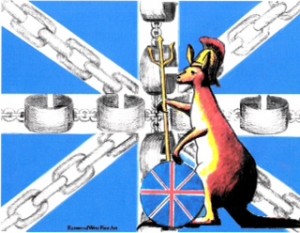A Compassionate Alternative to Hanging
January 26, 1788: Once You’ve Lost America, Where Do You Dump Your Petty Criminals?
 In 1606, Dutch explorer Willem Jansz discovered a large land mass south of New Guinea. From his tentative exploration, he found nothing to merit further interest. The land was swampy, and the natives poor and hostile. It would be another 36 years before the Dutch ventured a second expedition to this land. Abel Tasman sailed along the western and southern coasts of what proved to be a very large island. He found the lands there to be arid and uninhabitable. Yet, however dismal, this territory required some designation on maps. So cartographers gave it the generic name of Australis, the Latin for southern.
In 1606, Dutch explorer Willem Jansz discovered a large land mass south of New Guinea. From his tentative exploration, he found nothing to merit further interest. The land was swampy, and the natives poor and hostile. It would be another 36 years before the Dutch ventured a second expedition to this land. Abel Tasman sailed along the western and southern coasts of what proved to be a very large island. He found the lands there to be arid and uninhabitable. Yet, however dismal, this territory required some designation on maps. So cartographers gave it the generic name of Australis, the Latin for southern.
Not until 1770 did anyone bother to explore the east coast of Australis. British explorer James Cook found its land to be surprisingly habitable. The climate was temperate and the soil seemed arable. Eastern Australis could provide the basic requirements of a European colony. Claiming the land for Great Britain, Cook named the territory New South Wales. So Britain now had a distant island that offered a meager sustenance–and that proved exactly what Britain wanted.
In politics and science, 18th century Britain certainly was in the forefront of the Enlightenment. But that energetic progress did not extend to British justice. There the gallows was the usual recourse, dispatching thieves as well as murderers. Still, there was some leniency in the system. Shoplifters, poachers, prostitutes and debtors really did not deserve to hang. For stealing food, seven years in prison was sufficient retribution. The problem was that the prisons were teeming with these petty criminals. Britain could make better use of them by transporting them to its far-flung colonies. There, the felons could labor on government projects or be sold as indentured servants, working as slave labor for the length of their prison sentence. The American colonies had served as a useful dumping ground for these criminals. Indeed, Georgia had been founded expressly as a penal colony. However, since 1775, those colonies proved completely uncooperative with any British policies. With America lost, Britain found a use for New South Wales.
In December1786, the British government authorized an expedition to establish a penal colony in Australis. Eleven ships–known in Australian history as the “First Fleet”– departed from Britain in 1787. On board were 772 prisoners, of whom 189 were women, 247 marines as guards, and supplies to sustain the colony for its first year. Sailing around Cape Horn and through the Indian Ocean, the Fleet reached New South Wales on January 18, 1788. They first landed at an inlet called Botany Bay but the site lacked a source of fresh water. Sailing a short distance north, the Fleet found a more promising site for settlement on January 26th. It would be named for Britain’s Home Secretary: Lord Sydney.
The First Fleet would be followed by a Second Fleet, a Third Fleet and eventually no one bothered counting. Each fleet had a cargo of criminals. Over the next 80 years 162,000 shackled men and women would be transported to Australia. Today, the Commonwealth has a population of 22 million. Four million of them are descended from those convicts, and January 26th is remembered as Australia Day.
that explains georgia..yucks ,k